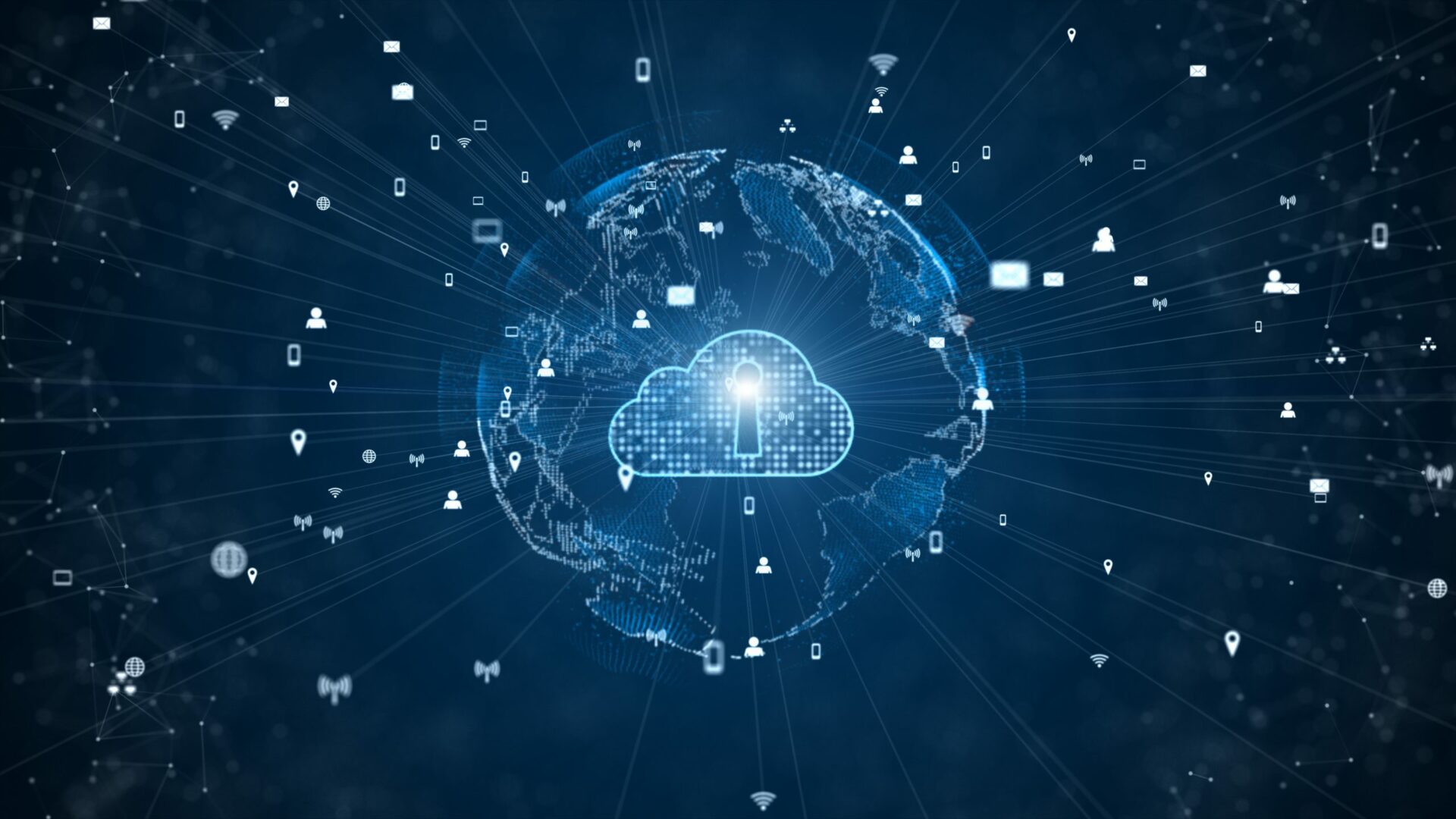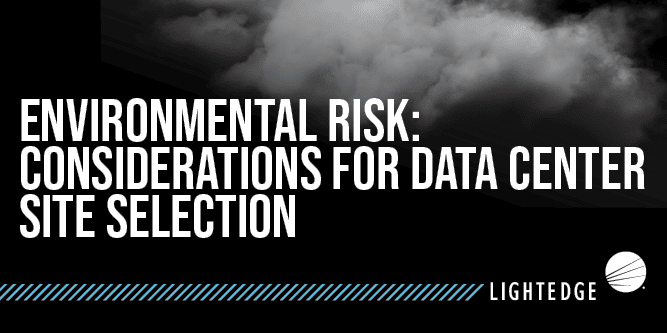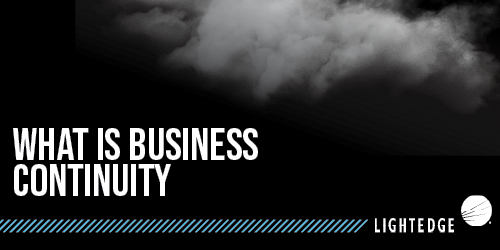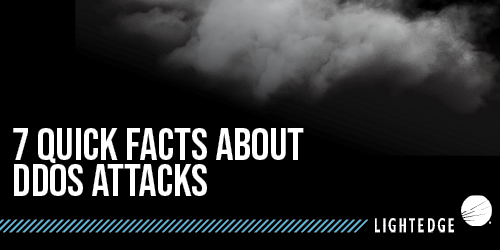What are Secure Data Center Services?
October 17, 2019

Lightedge
Author

Secure data center services refer to infrastructure that is physically and virtually protected from external threats and attacks. The secure infrastructure stores customers IT servers and is composed of networked computers and storage used to organize, process, and store large amounts of data.
For most enterprises that are considering moving to the cloud, data centers reduce the cost of owning and operating their own centralized data center facility. Secure data center providers offer various services such as data protection, disaster recovery, managed security services, and expert support.
Since most data center facilities hold confidential or proprietary information, such as intellectual property or financial cardholder data, providers have to be both physically and digitally secure. If you are looking to learn more about secure data center services and what to seek out in a provider, here is an enterprise guide for you to get started.
Data Center Security Defined
Data center security is complex. There are many moving parts to keep a facility and the customer’s critical IT infrastructure secure and operating at all times. The different security components must be considered separately, but all follow one unified security policy.
Physical security is an umbrella that covers a wide range of processes to prevent external interference. Software or virtual security is a different umbrella that covers security that prevents network data breaches, bypassing firewalls, or cracking other passwords and loopholes.
A top-tier secure data center services provider will provide a high level of availability and reliability through secure, certified data centers and dedicated staff onsite. Customized and scalable services give you the control, whether you need a colocation rack, cage or custom suite now or in the future.
Physical Security
A data center facility’s most apparent security characteristics are related to its design and layout. Facilities can be built for single-purpose or multipurpose. The latter is what we will be discussing today, as it hosts many businesses in a shared space. Typically, private or cage suites are available from top of the line data center providers for customers that require an isolated environment. Organizations within the healthcare or banking and financial industry may require a suite.
Secure data centers are built outside of flood plains, airport landing paths, railways, earthquake fault lines, and are a safe range away from power plants and chemical facilities. Other factors that data center facilities consider are geographies that experience regular natural disaster such as tsunamis, wildfires, hurricanes, tornados, blizzards, etc.
Access inside most secure data center facilities is limited. Limiting the entry points from the data center will decrease the risk of physical break-ins to the building. A data center can control access to the building by establishing one main entrance for customers and employees. There is typically one other entrance in the back of the data center for loading docks. Mantraps are additional security features which require multiple forms of identification, knowledge, and limited access to only authorized individuals.
If fire codes in the area require exits, secure data center install doors that do not have handles on the outside. This makes the door a fire exit only. Applying signs to these doors stating their purpose and that if opened, a loud alarm will sound, will ensure it is used only in the event of a fire. This alarm will trigger a response from the local fire and security command center. Installing fire exists will ensure the colocation facility is up to fire codes, but still limits entry points to the building from the outside.
Another physical security aspect includes barriers. Barriers such as fencing, thick concrete walls, lone-standing retaining walls and underground environments are some of the physical security that data centers can offer.
Virtual Security
Data breaches, malware, and spyware are threats that come top of mind when consider risks to stored data. A security information and event management tool (SIEM) offers a real-time view of a data center’s security environment. A SIEM helps provide visibility and control into everything from access and alarm systems and sensors on the perimeter fence.
Before applications and code are deployed, certain tools may be used to scan them for vulnerabilities that can be easily exploited, and then provide metrics and mitigation capabilities. Code may be run through a scanner to check for buffer overflows or other exposures. With the rise of cloud technology, visibility into data flows is a necessity, since there could be malware hiding inside of otherwise legitimate traffic.
Another element of a data center that should be designed with virtual security in mind is redundancy. Redundancy is in place to help facilities weather any incident with minimal downtime. Data centers need two sources for their utilities such as power, cooling, electricity and network connections.
Creating Security and Compliance Through Systems and Processes
A critical component of secure data center services is the creation of a culture that embodies the ideals of security. When selecting a data center partner, pay attention to the measures taken by the data center employees to authenticate visitors to the facility by key card, biometric access systems, or a combination of the two.
Only authorized visitors should be granted access to their own dedicated equipment in the facility after surrendering a government-issued ID to the onsite staff. External audits are one way to measure the ongoing effectiveness of a data center’s security policies and procedures.
All security systems should be monitored 24x7x365 and activities logged according to stringent controls and audited by a third party. These third-party auditors will issue opinions on whether or not that data center has met the standard of security. The highest such standards are ISO 27001, ISO 20000-1, or SOC 1 Type 2, SOC 2 Type 2 and SOC 3. You need to ensure that you are working with a partner who has met these standards.
What Compliance Standards Are in Place?
A data center must have controls in place that comply with industry recognized standards. Standard audits and certifications for data centers include: SSAE, PCI (payment card industry) and HIPAA (Health Insurance Portability and Accountability Act for protection of sensitive electronic protected health information).
Data centers that host systems relevant to their customers’ financial reporting are responsible for certain controls over those systems, such as physical and environmental security. The Statement on Standards for Attestation Engagements no. 18 (SSAE 18) is the new “attest” standard put forth by the Auditing Standards Board (ASB) of the American Institute of Certified Public Accountants. A SSAE 18 SOC 2 Type II audit is widely recognized because it represents that a service or outsourcing organization has been through an in-depth audit of their control activities.
This audit generally includes controls over information technology and related processes, policies and procedures, including operational activities and validates everything is performing at optimal standards regarding security, availability and operating integrity. Internet service providers must demonstrate that they have adequate controls and safeguards when they host or process data belonging to their customers. A third party that conducts a SSAE 18 audit reviews numerous processes and controls related to:
- Logical and Physical Access
- Security of Environment and Information
- Backup/Recovery
- Secure Storage
The Payment Card Industry Data Security Standard (PCI DSS) is an information security standard for organizations that handle cardholder information for the major debit, credit, prepaid, ATM and POS cards. The standard was created to increase controls around cardholder data to reduce credit card fraud via its exposure.
Because data centers provide space for companies to house servers as they conduct their business, the data center provider has specific responsibilities that must follow PCI compliance to ensure a safe, compliant and successful hosting experience.
Secure Data Center Compliance Certifications and Audits
Ask your data center provider if they have managed hosting services, or managed servers, in addition to colocation. A data center that only provides colocation services may lack the flexibility to meet the rising demands of many companies. Managed servers are single or multiple server installations with dedicated power and bandwidth, hosted within the data center. Managed servers are best suited to customers who would prefer that the data center own, operate and monitor the equipment on which their applications are running.
If a data center can provide both colocation and managed hosting, they should have the ability to augment a customer’s hardware infrastructure with resources on-demand. This hybrid hosting solution enables significant flexibility to grow and scale of resources. When a layer of virtualization is added to a managed hosting configuration, the customer can reap the benefits of cloud computing in what is known as a private cloud.
In today’s world of cloud computing, the ability to scale and provision services on-demand is a critical component to growing your business.
It is standard practice to regularly make backup copies of data and to store those copies offsite to protect against the case where a physical disaster destroys the only copy of data. Inquire as to whether the data center provider can help customers accomplish backup needs, including encrypted backups for compliancy. All of the backup tapes should be stored offsite in a protected environment.
If a data center provides backup services, how are they deployed and what is the fee structure? Overall, you are more likely to be successful if you have the flexibility of many supplementary services at your fingertips.
Are You Sold on Having Secure Data Center Services?
Finding a colocation provider that meets the security, network availability, scalability, and support that your organization require may seem daunting. Thankfully, Lightedge is top performing in each of those categories, but don’t take our word for it. Take a virtual tour through one of Lightedge’s seven data center colocation facilities with the hosts of Off the Cuf to see our world’s most secure data center.
As a top-tier colocation services provider, we deliver a high level of availability and reliability through secure, certified data centers and dedicated staff onsite. Our customized and scalable services give you the control, whether you need a colocation rack, cage, or custom suite now or in the future.
Lightedge’s highly trained compliance and security experts take the guesswork out of keeping your business protected. Trust our expertise to ensure you are covered through our security and compliance services, including risk management, information security, audit preparedness, and support.
With geographically dispersed facilities across all of the US power grids, our data centers are the heart of our operation and yours. We have a wide range of colocation and disaster recovery solutions delivering advanced shared infrastructure designed to enable operational and financial efficiency, reducing the burden on your IT staff.
Lightedge business support services are available 24 hours a day, 7 days a week, no exceptions. Our technical support starts with direct access to technicians in Lightedge’s Network Operations Center (NOC) via a toll-free number for emergencies. The MyLightedge Portal allows you to open tickets, track progress and more for all of your services.
Customers turn to Lightedge to reduce risk of non-compliance, scale security, and for our proven predictably and cost-effectiveness. Lightedge provides customers with an extended team of experienced engineers, so you can refocus internal resources on agility, differentiation, and running towards achieving your desired business outcomes. Are you curious how your current provider stacks up? Our security experts will provide a free security assessment to see how you measure up against the latest compliance and security standards. No risk, no commitment. Contact us today to get your free security assessment.
Related Whitepaper:
- 10 Critical Questions to Ask Your Data Center Provider
- What to Look for in an SD-WAN Solution
- Why You Shouldn’t Own and Operate Data Centers
- How Colocation Facilities Can Cure Your IT Headache
Related Posts:
- 6 Important Considerations For Choosing A Secure Colocation Provider
- Des Moines’s Newest Cash Crop: Data Centers
- Debunking Underground Data Center Misconceptions
- 5 Reasons Your Growing Business Needs Compliant Colocation
- The Best of Both Worlds: Colocation and PCI DSS Compliance
- Data Center Design: Compliance, Location and Regulations
- Data Center Security: Why Providers Should Build Security into Every Detail
- What to Look for in HIPAA Compliant Hosting
- Data Center Checklist: 5 Factors for Choosing a Data Center
- Data Center Location: 4 Things to Consider
- What to Look for in HIPAA Compliant Hosting
- Underground Data Center Storage: What to Know & How to Avoid Failures
- Moving to the Cloud from Traditional IT: Why and How


